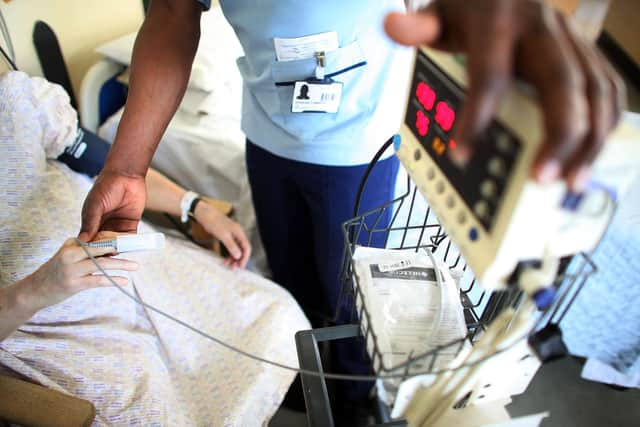NHS in crisis: How private businesses can ease the pressure on the health service – Alastair Stewart
"Everyone – rich or poor, man, woman or child can use it or any part of it… it is not a ‘charity’. You are all paying for it, mainly as taxpayers, and it will relieve your money worries in time of illness.”
More than 70 years later, "time of illness" has a different meaning. According to the statistics from Public Health Scotland, in the week to June 5, 69.6 per cent of the 27,846 people who went to A&E were seen and subsequently admitted or discharged within four hours. The Scottish Government's target is for 95 per cent of patients to be discharged or admitted within four hours.
Advertisement
Hide AdAdvertisement
Hide AdSo bad is the current situation that virtual A&E video calls are being trialled on people who call NHS 24 and might need emergency department treatment.
With the NHS under pressure and at capacity, businesses should lead the way in illness prevention and early intervention.
Health and Safety Executive statistics showed that workplace-related illnesses cost £10.6 billion to the UK in 2018-19, pre-Covid, while injury cost £5.6 billion in the same period.
A recent YouGov survey launched during Occupational Health Awareness Week found that 70 per cent of UK adults think occupational health is important. Still, just ten per cent believe some current workplace health and well-being services are essential.
In April 2022, Deloitte found that poor mental health costs UK employers up to £56 billion annually. Some 1.7 million people suffered work-related health conditions in 2020-21, with 800,000 work-related mental health issues and 500,000 musculoskeletal disorders.


The Society of Occupational Medicine and the Commercial Occupational Health Providers Association have identified long Covid and mental health as the most critical workplace health issues of 2022. They have also warned that companies which provide occupational health programmes without professional advice might be wasting time and resources.
As well-meaning as this might be, efforts must be coordinated to help businesses shift away from a reactive "DIY" culture regarding workplace health and seek expert occupational health guidance to avoid wasting time and resources.
The NHS is rightly a hallowed organisation, but twin fears of lecturing people about their health or suggesting it is a failing institution hamper the introductions of changes that could take place in workplaces.
Advertisement
Hide AdAdvertisement
Hide AdThe need is stark. The Scottish Government has said that "people should consider whether their condition is an emergency, such as a stroke, heart attack or major trauma, before going to A&E”.
Encouraging people in crisis to doubt the severity of their case in a crisis is an admission of total failure. This year's review of the NHS by Audit Scotland warned of an "ever-increasing backlog of patients waiting to be seen", and that rising spending on the health service was "unsustainable".
For years, the promotion of preventative healthcare methods stemmed from the logical and evolving notion that people should control their health and lives as much as possible.
There has been a divide between "legitimate" reasons for attending hospital and should-have-known better incidents like DIY-related injuries, alcohol, or reckless behaviour. Be active, do not smoke, and curtail your drinking. There is a half-serious flirtation with fining disruptive drunks in accident and emergency.
We are now living in a country where many are relieved that an ambulance only took four hours to arrive instead of seven.
The lack of any enunciated public health strategy that meshes pragmatism and individual responsibility makes public health provision an impending disaster. It also means the system is failing to tackle the lingering and seismic consequences of Covid.
Figures released this month showed that more than 10,000 people in Scotland have been waiting more than two years for NHS treatment. In May, the Institute of Public Policy Research found that 200,000 people are reported to have left the workforce due to a long-term illness since the onset of Covid. Combined with 200,000 others who have left the workforce due to other health reasons, this equates to an economic output loss of £8 billion in 2022.
The Office for National Statistics estimated that the number of people in the UK suffering from continuing symptoms of Covid such as fatigue, muscle pain and breathing problems has doubled in a year from a million in May 2021 to two million last month.
Advertisement
Hide AdAdvertisement
Hide AdThe Royal College of Nursing has described the lack of specialist NHS clinics and disparities in care around the UK as “woefully inadequate to meet the level of demand”.
Preventative measures in the workplace represent a massive tool at our disposal. The right to a safe and healthy working environment is now part of the International Labour Organisation's Declaration of Fundamental Principles and Rights at Work. The change by the ILC – the UN parliament for workplace issues – is the first extension of workers' fundamental human rights in a quarter of a century.
In April, a report by the Chartered Institute of Personnel and Development found that 87 per cent of organisations offer employee health and well-being services. Still, only 50 per cent had a strategy, with 46 per cent declaring that they do not have a formal plan and act on an ad-hoc basis.
The Public Health Scotland's Strategic Plan 2020 to 2023 touches more on prevention and "more aligned and collaborative action”. The best way to protect the public sector is to prevent, reduce and shorten hospital admissions.
Politicians should lead the way in having a candid conversation about the state of the health service and where individual responsibility fits into this. Warning people away from A&E looks like a structural collapse.
A loud and practical debate needs to be had, not proselytising personal accountability or institutional failure but emphasising the sorry state the NHS is in and what can be done to keep it from buckling entirely.
Comments
Want to join the conversation? Please or to comment on this article.
